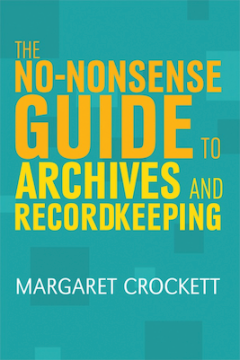
Additional Information
Book Details
Abstract
This practical how-to-do-it guide is ideal for professionals involved in the management of archives and records, especially if they are just starting out or without formal training.
The book covers all aspects of recordkeeping and archives management. It follows the records’ journey from creation, through the application of classification and access techniques, evaluation for business, legal and historical value and finally to destruction or preservation and access in the archive.
Based on the internationally renowned training days run by the author and her business partner, The No-nonsense Guide to Archives and Recordkeeping deals with records and archives in all formats. It utilizes checklists, practical exercises, sample documentation, case studies and helpful diagrams to ensure a very accessible and pragmatic approach, allowing anyone to get to grips with the basics quickly.
The book is divided into four main work areas; 1) current records: including creation, filing, classification and security; 2) records management: including aims, risks, planning, preparation and delivery; 3) archives management: including collecting policies, intellectual property rights, appraisal, digitization and outreach; and 4) archival preservation: including policy, disaster prevention and repositories.
This one-stop-shop will be essential for a wide readership including archives and records assistants, librarians, information managers and IT professionals responsible for archives and records and managers of archives staff.
...an invaluable contribution to the everyday bookshelf of the archivist and recordkeeper
Archives
... an excellent primer, refresher, and reference guide for those without a formal background in records management and archival practice. Thanks to Crockett’s thorough overview, even the experienced professional would likely find reminders of some aspects of the profession they may have lost familiarity with. With its particular focus on incorporating records management concepts into a typical office workflow, the book’s real strength lies with the managing of more active records, and would work nicely for the non-information professional looking to gain control of their information environment.
Ashley L. Taylor
University of Pittsburgh
Technical Services Quaterly
The useful summaries and pithy sound bites will enable those managing archivists and records managers to advocate from a sound and accurate basis. I enjoyed reading it and think it makes a useful contribution to the guidance available to those working in the profession.
Caroline Sampson
Archives and Records
I would recommend this book to anyone new to the profession as it is an easy to read volume providing a comprehensive introduction of the work of archivists and records managers. Even those who have worked in the profession for some time will find this volume a good refresher of the procedures. Crockett’s extensive experience of delivering training days on this subject is evident in having produced such a valuable guide.
Rebecca Somerset
Catholic Archives
This practical how-to-do-it guide is ideal for professionals involved in the management of archives and records, especially if they are just starting out or without formal training.
The book covers all aspects of recordkeeping and archives management. It follows the records’ journey from creation, through the application of classification and access techniques, evaluation for business, legal and historical value and finally to destruction or preservation and access in the archive.
Based on the internationally renowned training days run by the author and her business partner, The No-nonsense Guide to Archives and Recordkeeping deals with records and archives in all formats. It utilizes checklists, practical exercises, sample documentation, case studies and helpful diagrams to ensure a very accessible and pragmatic approach, allowing anyone to get to grips with the basics quickly.
The book is divided into four main work areas:
- current records: including creation, filing, classification and security
- records management: including aims, risks, planning, preparation and delivery
- archives management: including collecting policies, intellectual property rights, appraisal, digitization and outreach
- archival preservation: including policy, disaster prevention and repositories.
One of the greatest challenges in writing a useful handbook or manual for the “lone arranger” archivist, volunteer archivist, or museum/historical society staff member who also manages archives is striking the proper balance of instruction, complexity, and ease of use: too much information can be intimidating, but not enough will limit a book’s usefulness. Margaret Crockett ably strikes that balance in The No-Nonsense Guide to Archives and Recordkeeping, having created a guidebook whose comprehensiveness belies its relatively short length. While busy lone arrangers and archival volunteers may lack the time to dive fully into a book such as this one, it is nonetheless a valuable resource that these audiences would do well to have on their shelves for frequent consultation and guidance.
Jamie Serran
Council of Nova Scotia Archives
Archivaria
Margaret Crockett is a qualified consultant in archives and records management with over 20 years of professional experience and is one of the two partners in the Archive-Skills Consultancy Ltd.
